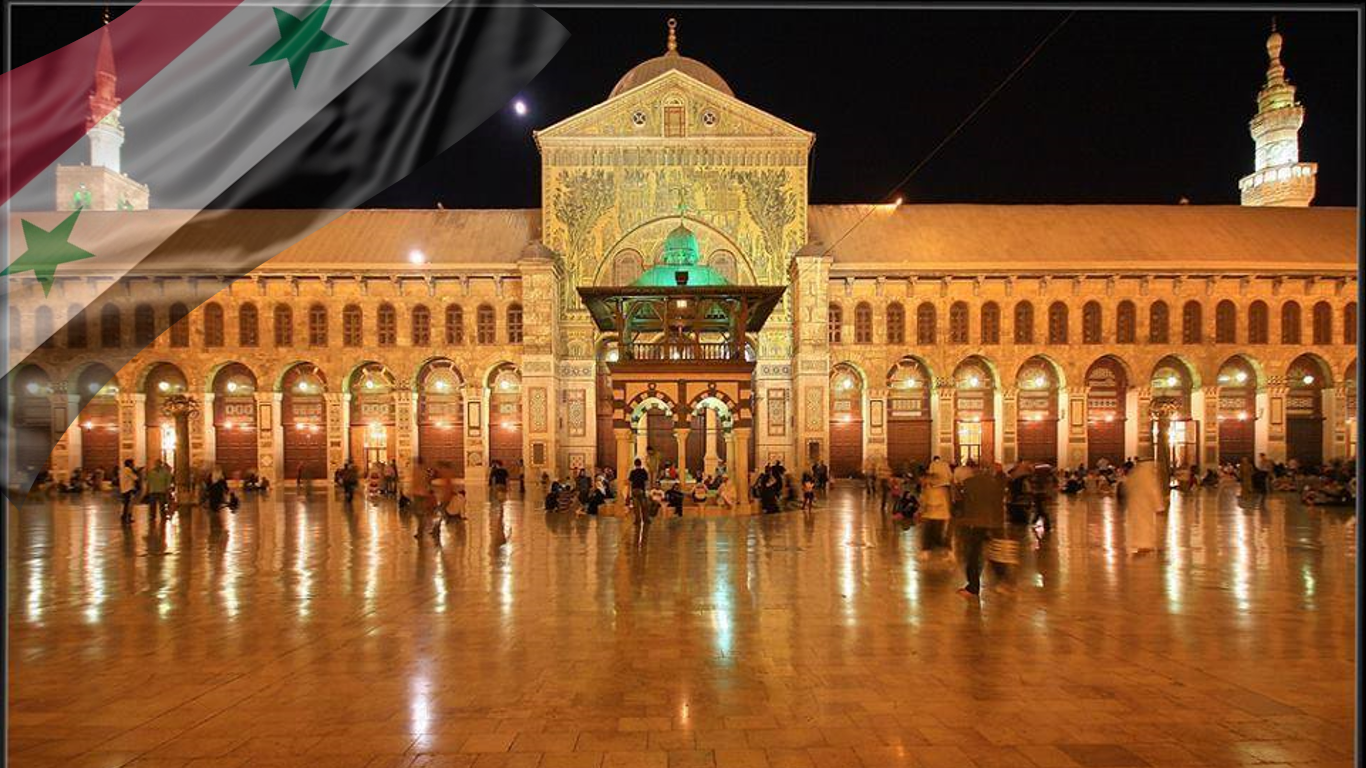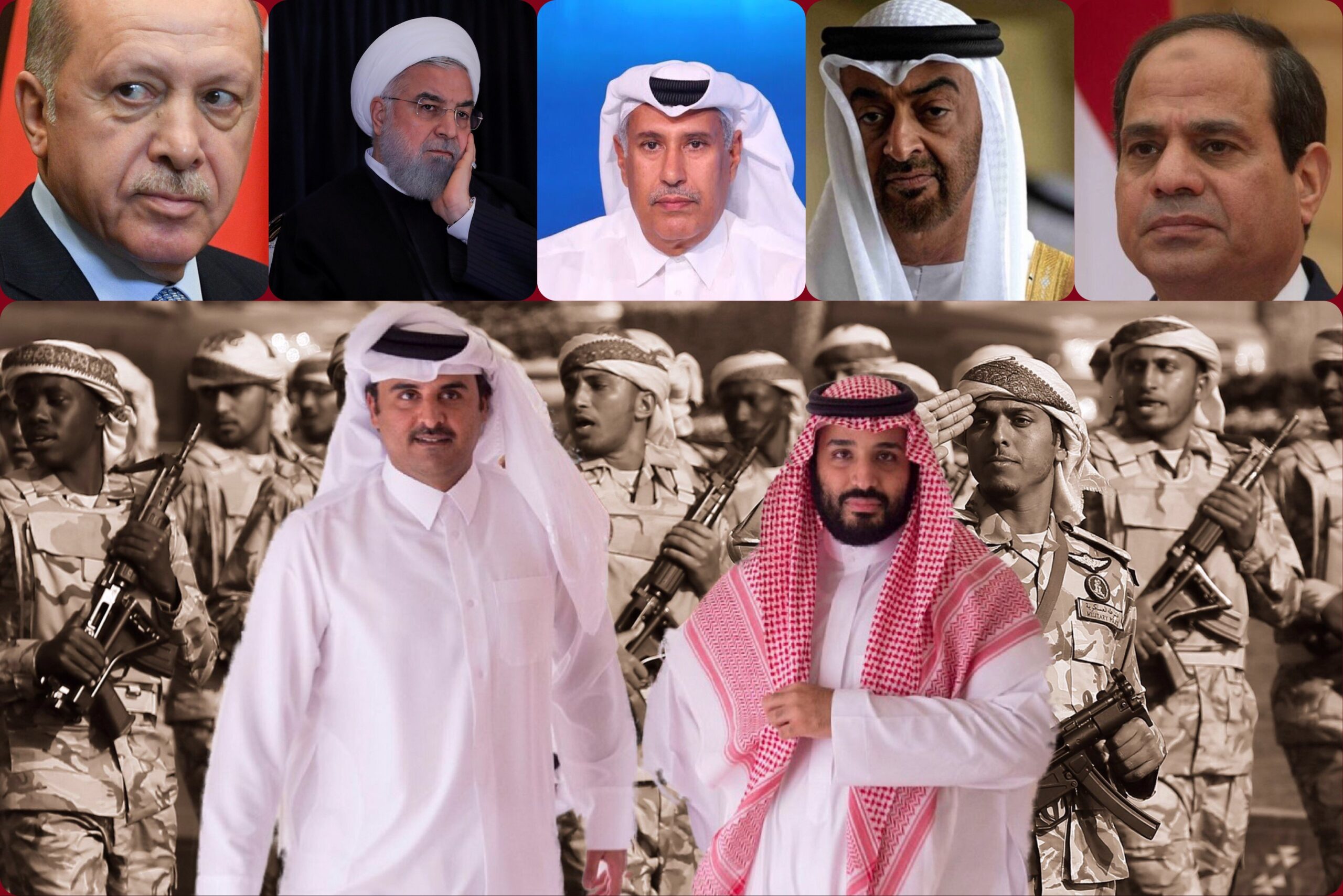It was on 4 May when news started to circle that a coup had just happened in Qatar. For a moment it seemed that once again after 1995 and 2013 power shifts in the Qatari leadership in an unconventional way. Hours and days passed and the news did not get any confirmation from the major news outlets, which suggested that it might have been a hoax, a foiled attempt, or some manipulation to cause distress, yet power was still firmly in the hands of Emir Tamīm ibn Ḥamad and his entourage.
The story might even have died out, but some Egyptian outlets, mostly from the second line sources still keep it alive with never and never additions, and even more respectable Saudi outlets have joined the campaign. And that started to give some credit to the claim. Egyptian, Saudi, or Emirati sources, or those under their influence, however, are hardly trustworthy on Qatar, knowing that these states, especially Egypt and the Emirates for long have a feud with Qatar, and would love nothing more than to see a major change in Doha. In fact, Abū Zabī was working on that for years and it is highly probable that the Emirates stood behind the blockade in 2017 and even the still mysterious change in power in 2013. Yet a week later, on 12 May Kuwaiti Foreign Minister Aḥmad aṣ-Ṣabāḥ, an otherwise not powerful personality, flew to Doha to deliver a personal message from the Emir of Kuwait, a state that famously tried to mediate in the blockade in 2017 and practically stood by Qatar ever since. Suddenly pieces started to get together that indeed something might have happened, or was at least tried in Qatar.
But that raises the question, especially for those less familiar with the Middle East, what would have changed with a coup. Indeed the question is important, who could have taken over from the young Emir Tamīm, who is only in power for seven years. But what is more important, what new direction would Qatar take after such a change, and why is it important for the region.
In fact, Qatar is not any better known than the Emirates, in which the inner power structure was looked over a few weeks ago. These two states are the nexuses of two vast networks of alliances, which are dominating Arab policy for almost a decade, and which were dictating policy, much more than it is attributed to Saudi Arabia by many. This Arab “Cold War” goes on for decades now, much resembling a tribal feud. However, with powerful allies in both sides and the clashes are manifesting in several fields from Syria, Iran, and Yemen, all the way to whole North Africa.
If we know little about the inner circles of the Emirates, even less is known about Qatar. A state little in size and population, but very powerful in assets and allies. So far Doha played this game of regional power struggle beautifully, but there might be indications that its enemies managed to gain an advantage.
Who is Emir Tamīm really, and who are his aids? What is the relevance of Qatar now, especially in the light of the whole regional equation? What are the inner cracks that started to appear, and what really happened in 2013, which brought Emir Tamīm to power?
Has a coup gone unnoticed?
On May 4 the al-Waṭan News, a secondary level channel with mostly social network activity claimed that a coup took, or is taking place in Qatar. It attached a number of comments from Twitter, and not a much-telling video about and alleged shootout. It was suggested that former Qatari PM and Foreign Minister Ḥamad ibn Ğāsim ibn Ğabar Āl Tānī, the cousin of former Emir Ḥamad ibn Halīfa (1995-2013) and the practical puppet master of Qatari policies until 2013, was trying to stage a coup with a number of officers and troops still loyal to him. According to this version the reason was, though for long there has been an uneasy relation between him the and new Emir Tamīm, that an investigation was ordered against him over the so-called “Barclays Bank” scandal. Allegedly huge Qatari bribes were transferred to the British Barclays Bank to save it from British governmental bailout, or bankruptcy, in exchange for channeling a number of political persuasion maneuvers. Though there are several bribery allegations against Qatar, and Ḥamad ibn Ğāsim personally from the Panama papers to the controversies around FIFA World Cup 2022 won by Qatar, nothing has ever managed to reach so far to implicate the Qatari leadership. Since the investigations by January 2020 have indeed reached a critical phase it would not be surprising to see an evasion attempt by the current rulership to put all blame on the former superintendent, and thus ditch the case. The Middle East is full of such examples. So thus far, it could have even been this way, though it is more doubtful, whether Ḥamad ibn Ğāsim would stage a coup, only to evade scrutiny.

A day later the same sources went further claiming that in the city of al-Wakra in Qatar a family feud between the leading members of the Qatari royal dynasty got out of control leading to shootings, but by than even these sources have doubted that the former PM would have the courage or the support to make such a move. However, the story did not die out, and by 13 May it was held, this time based on the claims of a member of the Qatari household living in London, Fahd ibn ‘Abd Allah Āl Tānī that Turkey played a key role in the event, which demanded a $2.8 billion loan from Qatar to support its failing economy, which caused a feud in the family and led to a fight and number of deaths in the royal dynasty. And that has some verified bases, as the Turkish lira started to fall rapidly once again, and Erdoğan asked a bailout from Qatar to stop it. So far all these news were on very shaky grounds as mostly Egyptian outlets with questionable reliability pushed the claim. However, on 7 May even al-Arabiyya picked up the story, which is Saudi Arabia’s biggest international media network. And it put it out in English. They quoted even more Qatari princes – all living abroad – about a coup, which even targeted the Turkish embassy in Doha, and was only suppressed with the help of Turkish troops and with the death of a number of princes supporting the coup. Noticeable, however, that while al-Arabiyya put down a rather long and detailed story and plenty of explanations for why Ḥamad ibn Ğāsim would attempt a coup, from fraud investigation to never pledging loyalty to Emir Tamīm, who he regards as a boy, even that article called the event “bizarre coup rumors”. And soon enough accusations even implicated the Irani Revolutionary Guards (Pāsdārān) helping to quell the coup, since their perceived presence and control over Qatari state security is an old Saudi-Emirati rumor.
Naturally, the two most vocal responses denying the story, while the matter practically slipped from the mainstream Western media, came from the Qatari Al-Jazeera, and the Turkish TRT, both very quite detailed coverage. TRT focused more on the Saudi infowar apparatus to run the story high in the social media, while in al-Jazeera’s coverage it is more interesting to see that it attaches other recent claims of torture and killings in Qatari prisons in late April and that even Sky News Arabic and BBC Arabic joined the campaign, yet they later deleted their stories. A claim very hard to verify, but if true, would lead to something much bigger than just a sudden family feud.
Because strangely enough, the part of the story missing from the original claim, while it had a very strong foreign policy connection, was the outer support for such a coup. Indeed these sources described the matter as a growing internal dissent against the ruling elite in Qatar, amplified by popular unrest, which wants to free the country from Turkish-Iranian oppression. Though it has some family dispute element in it. In other words that is an internal issue with no foreign supporters behind it. A claim in itself is very doubtful in the Middle East all over. Especially after January 2019, when Reuters reported Operation Raven, a major Emirati spying maneuvering using a tool called Karma against mostly Turkish and Qatari officials, and which even managed to hack into Emir Tamīm’s mobile. And it soon turned out that an Israeli company was working on the project. After such a major and previously unbelievable operation, it is not far fetched to believe a major hoax behind this. Especially that the Emirates was very silent on the matter.
So far we would think that this was most probably an elaborate hoax by either the Saudis, or the Emiratis and they let a number of social media platforms and Egyptian net pages to run the story, only to further discredit Qatar, or to saw discord and suspicion within the Qatari royal family. However, on 12 May Kuwaiti Foreign Minister Aḥmad aṣ-Ṣabāḥ arrived to Qatar in a surprise visit, delivering a message from the Kuwaiti emir, about which we later learned nothing. While that on its own is not significant, the timing and the secrecy is, knowing that in 2017, when the blockade against Qatar was set up Kuwait went great lengths to mediate, after which it practically departed from Saudi-Emirati policies. In this sense, Kuwait took the side of Qatar, and never severed relations with it. If the message has any connection to the alleged coup, which we have no way of confirming, that would be the first outer and impartial sign to suggest that something happened. Either a foiled coup attempt, an attempt to create one from abroad, or a renewed pressure campaign.
And the idea that there is discord in the Qatari ruling elite is not new and can be verified much more than the claims of certain low-grade Egyptian outlets.
The Qatari elite
Qatar, which dates its unification and independence in 1878 after a long series of Portuguese, Ottoman, and British rule only became truly independent in 1971. Though it was rich by pearl fishing and trading it was never a significant power center, at least until the early 2000’s. It was an underdeveloped and very conservative statelet with little population and huge gas reserves when slow development started. It really started to speed up after the bloodless coup in 1995 Emir Ḥamad ibn Halīfa against his father, who lived a long life even after the coup, only passing away in 2016. Most of the achievements associated with Qatar today, from the world-leading sports facilities, the leading educational project lead by the Qatar Foundation to the media empire lead by al-Jazeera, were all achieved under his rule. And with such a success that Qatar achieved the biggest GDP/capital, and one of the best living conditions in the world. Though these are impressive achievements, Sheikh Ḥamad ibn Halīfa was always more interested in sports and was never a strong, or charismatic ruler. The real strongman behind him was the mentioned Ḥamad ibn Ğāsim, who became Foreign Minister in 1992, so even before the 1995 coup. Behind which by many claims he was one of the architects. In 2013, under still-mysterious circumstances, Ḥamad ibn Halīfa, without any major previous indications, resigned in a televised speech in favor of his fourth son, current Emir Tamīm. Though in many parts of the Middle East that would be strange, not in Qatar, as a number of former Qatari emirs had resigned before and passed their powers on to their sons, or brothers.
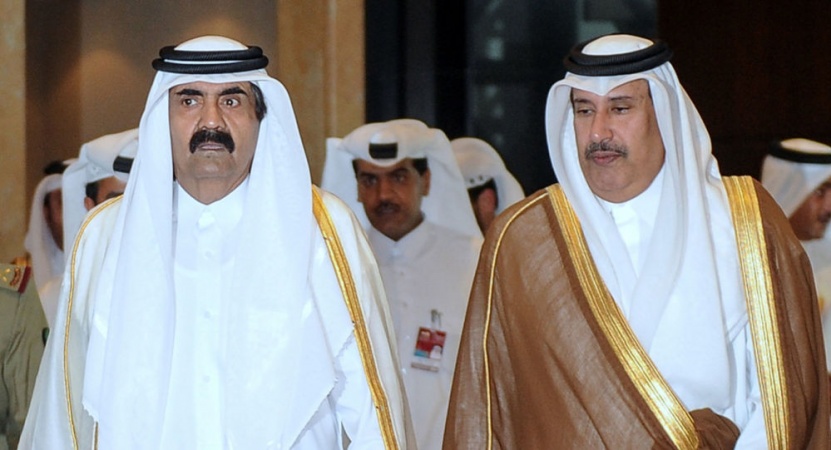
The mysterious in the matter is that it happened in the summer of many major changes. Most significant amongst these was the coup in Egypt overthrowing a Qatari supported government, but all the changes that time indicated Qatar lost its race for regional supremacy. Even more mysterious that with the emir’s departure Ḥamad ibn Ğāsim was also replaced, thought for long he remained significant giving interviews and revealing important details about the so-called Arab Spring, all to defend Qatari interests. But after July 2013 a new management was drawn up, which still rules Qatar. Not as colorful as the Emirati one and smother in takeover, but not any less proficient.
The new Emir at the top of the list might have seemed a strange choice from the outside, as out of the first two wives – Ḥamad ibn Halīfa all together has three – the Emir had four sons in age to replace him and Tamīm is the youngest one.
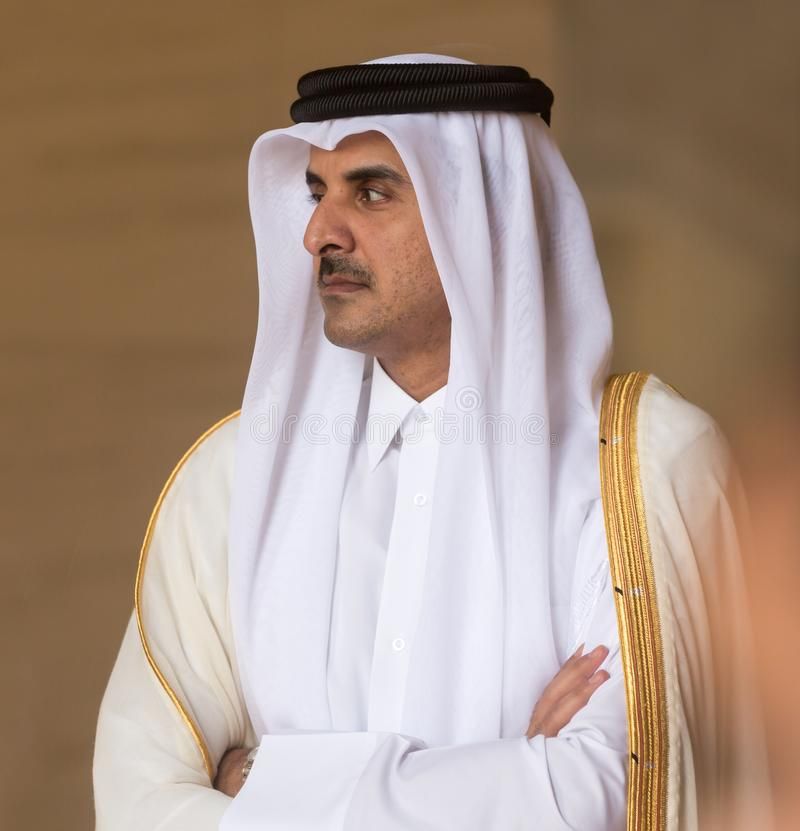
The original heir was not Tamīm for long, but the former Emir’s second and most famous wife, Mūzā bin Nāṣir al-Misnad, managed to secure succession for her sons. First to her elder, Ğāsim, who renounced – or was found unsuitable and was forced to renounce – his rights for succession. That is how Tamīm was choices. Born in 1980 and only 33 at the time of the accession he was really young to take over, another sight that it was not only the personal wish of the former Emir, which prompted the change. Tamīm had an intensive academic and military education in the U.K., like Sandhurst, like so many of the Gulf royalties, speaks good English and French and a devoted sportsman. He had a brief military career in Qatar, but soon took over the sports and business and still head of the Qatari Investment Authority. Though he has three wives and already 13 children, he is seen much less flamboyant and lavish than most Gulf royalties, and even a likable personal image was created around him. Like when he visited London pictures were shown about him sitting alone in a cafe in ordinary clothes. He is told to be a light friendly character, who was feared to be too weak in the beginning, but by now it clear that he is at charge and in the last few years started to put together his own staff. But in the beginning, he surely needed strong men, mostly chosen by the old guard of his father.

‘Abd Allah ibn Nāṣir Āl Tānī, a veteran politician with a carrier in the army and law enforcement and with a substantial British and Lebanese education chose to be the new PM and Minister of Interior.
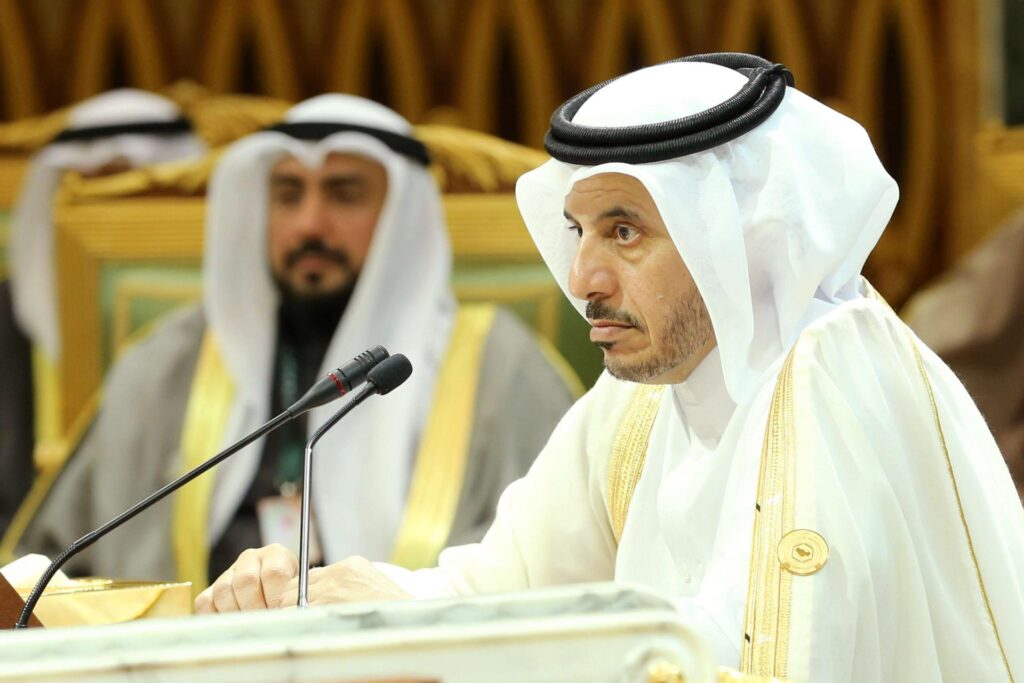
He was perceived much less energetic and visionary than his predecessor, but a very efficient statesman, who secured the Emir Tamīm’s takeover. He was building up the new relations after 2013, mostly focusing on Turkey, but promoting a low profile and conciliatory regional policy, which made it possible for Qatar to survive the obstacles.

By late 2019, however, he was reportedly becoming worried that Qatar drifted too far from the Gulf mainstream, too close to Turkey and Iran, and suggested a slow backtrack on this trajectory. His frustration with Turkey grew, and in January 2020 he was replaced, allegedly by requests of Erdoğan himself. His successor is Hālid ibn Halīfa Āl Tānī, a far weaker character, much more under control of Emir Tamīm.
The real strong man behind Tamīm, and most probably his father as well, is brute, but quite illusive member of the al-‘Aṭiyya family. A family, which gave many ministers and advisors. He is Ḥamad ibn Halīfa ibn ‘Abd Allah al-‘Aṭiyya, who was appointed main advisor of Emir Tamīm upon his succession.

Little is public about him, but most Arabic sources attribute vast connections to him all over the Arab world as a shady businessman. Also via his brother ‘Abd al-‘Azīz ibn Halīfa ibn ‘Abd Allah al-‘Aṭiyya and known radical and head of several organizations charity on paper, but suspected to be covers for financing radical elements. In 2013 ‘Abd al-‘Azīz, the brother of the main advisor was even arrested and sentenced to eight years of prison in Lebanon for recruiting and financing terrorist groups in Syria and Lebanon, the biggest of them the an-Nuṣra Front. The incident caused a huge scandal to Qatar, as suddenly many operations became known facts. Doha heavily pressured the Lebanese authorities to set ‘Abd al-‘Azīz free, which happened, but this matter suddenly revealed that his ring was operating a huge ring all over the Gulf, collection donations and material support to be delivered to armed groups in Syria, Lebanon, Iraq, and Libya. That was also the time when the most horrific acts of the an-Nuṣra Front became known in the international press. It was feared that would implicate other Gulf states in this operation, but also that this ring might be used against the Gulf elites one day. That prompted pressure by Riyadh and Abū Zabī and that summer Doha signed an agreement to refrain from interfering in other GCC members’ internal affairs. From that, it is only probable that this incident triggered the sudden change in Qatar that summer when dissatisfaction and Emirati envy finally met, and a campaign was started against Qatar on multiple fronts.
Ḥamad al-‘Aṭiyya is an illusive figure, but he is held to be master of several networks, including those still active in Syria and Libya, and those working together with the Turkish state. He is also the practical head of the al-‘Aṭiyya family, which gave many dominant members of the Qatari elite, including Hālid ibn Muḥammad al-‘Aṭiyya, Tamīm’s first Foreign Minister after the deposition of Ḥamad ibn Ğāsim, though he was trained directly under him. In 2016 he was moved to be the Minister of Defense, thus being mainly responsible for the facilitation of the Turkish alliance.
As Foreign Minister, he was replaced by Muḥammad ibn ‘Abd ar-Raḥmān ibn Ğāsim Āl Tānī, a young – same age as the Emir – and energetic member of the royal family from a side branch. Muḥammad ibn ‘Abd ar-Raḥmān had an education in Qatar with no reported foreign training, thus counting be very limited, and suggest that he is only a caretaker by the Emir’s willing, not at all a strong person, like his predecessors were. Thus suggesting that Emir Tamīm started to create his team already in 2016, which by now is complete, leaving many former strongmen out of power, who might have an ambition to return.
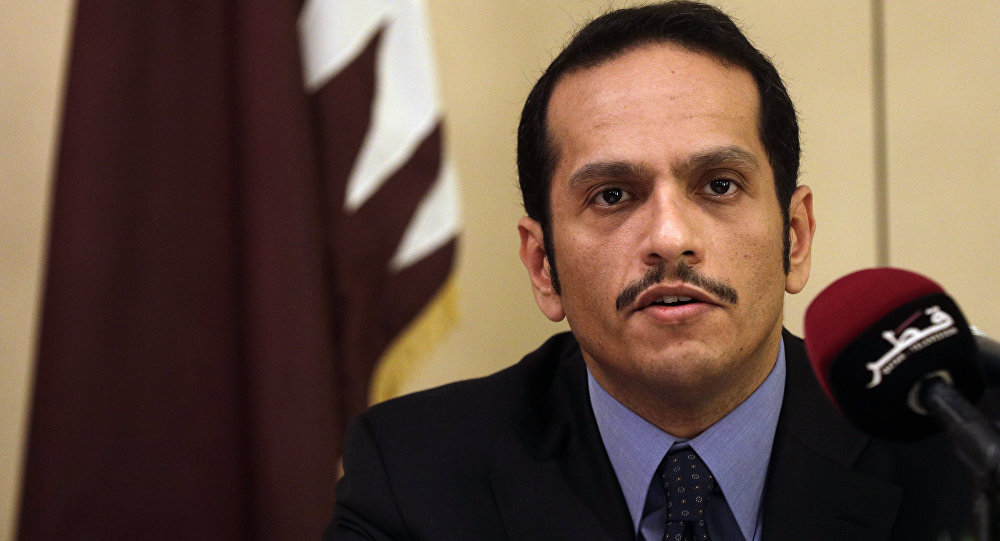
If we mentioned about the Emirates their good network of imported professional to the foreign staff, nothing less can be said about Qatar. The Emirates recruited the Palestinian Muḥammad Daḥlān, who turned out to be very efficient, while Qatar found a more intellectual character, even Christian Palestinian. ‘Azmī Bišāra was born in Nazareth and had a very good education until he entered politics and was elected four times into the Israeli parliament as a member of an Arab party. After the 2006 war launched by Israel against Lebanon, Bišāra visited Lebanon and Syria, for which he was charged for a number of crimes in Israel, and he never returned. He took refuge in Qatar, where exceptionally he became a citizen and became director of the Arab Center for Research and Policy Studies and the practical head of the Doha Institute. Thus putting him in charge of the biggest intellectual centers of Qatar. Though he denied it, he is rumored to be one of the main advisors of the Emir, and in charge of the Israeli-Palestinian folder. He allegedly has good connections with Ḥamās, and he facilitated the organization’s relocation from Damascus to Doha after 2011, even its support for the terrorist factions in Syria. Bišāra is more of an intellectual character, not a fought man like Daḥlān, but surely a profitable addition.
One of the last members of this clique, who is hardly a decision-maker, but a good example of the Qatari foreign power and ambitions is another alleged personal advisor for African policy. He is Karīm Wade, son of former Senegalese President Abdoulaye Wade (2000-2012). Karīm Wade was his father’s top man and suspected successor, but after the lost election in 2012, he was arrested for corruption and spent three years in prison.
His links to Qatar are scarcely supported, but would not be surprising, for a state that regardless of its relative small size once ruled over the relations between the Ṭālebān and the US, even hosting a Ṭālebān embassy, moved most of the terrorist groups in Syria since 2011, practically controlled the Egyptian government under Mursī, and still a major player in the Libyan matter.
What would have changed?
Of course one of the biggest question in relevance to the region is what would have changed with the removal of Tamīm. Though the most important key for this question requires the knowledge of who would have substituted him, it is fair to see that a change in this scale would have had the support of the biggest rivals currently, Egypt and the Emirates. Much can also be speculated from the now aired alleged claims demanding change.
Almost always at the top of the claims of dissent mentioned the foreign policy, namely that Qatar drew way too close to Turkey and Iran, thus enabling their political and cultural intrusion to the inner Arab matters. Which is the Gulf phraseology means inner Gulf matters. So it is deductible that the forces supporting the perceived coup would love to see that policy to be changed. Losing such a strong promoter of alliance with Turkey, the new elite would most certain end the current ties and would evict the two Turkish military camps. It wouldn’t really have any alternative under pressure. With the end of such a strong tie with Ankara, and a possible lifting of the blockade, there would be no need for the current reliance of Iranian benevolence and Doha would start to drift away from Teheran. Once again tipping the scale in the Gulf in favor of the anti-Iran elements. So the results would soon manifest in a number of matters. Like in Syria, where the Gulf now could help against Turkey, and even Israel, thus pulling Damascus closer once again.
Egypt also sees the benefit in all these matters. First of all, after years of picturing the Qatari leadership as nothing less than the Satan, seeing such a blow would be a huge triumph for as-Sīsī. That would silence much dissent against the current Egyptian President. That would also deprive Turkey from its best ally, and it most stabile financial supporter, which likely to tip the scale in Libya as well. That is the direct interest of Egypt, to reach a solution in Libya with a new leadership under its influence.
But what is the interest of enemies of the current Qatar ruler in the Gulf? The most vocal demand is that Qatar should return to the common Gulf line of policies. That might sound logical, supported by the fact of the blockade, however, there is no real Gulf line anymore. Traditionally Saudi was the weight of the Gulf following its own interest, but “keeping the Gulf flock together”, respecting every allied interests. At least to some level. But with a growing economic crisis, a continuous series of arrests within the ruling family, clear messages of even American dissatisfaction with Riyadh’s new ruler, and now even losing the Yemeni bid to the Emirates, Saudi is hardly the power center it once was. It can not coordinate, even less enforce a common GCC policy, which was all to visible in the blockade against Qatar, in which only Bahrain followed suit, but Kuwait chose to stay neutral, and Oman distanced itself from the crisis, even tacitly helping Qatar. So even if the Emirates and Egypt, with or without the support of Riyadh could turn Qatar around and put a more lenient elite in power, the question stands. What would they do with it?
Given the ever growing erosion of the Saudi elite and power, being neutral is not even enough from Qatar. Much rather it is expected to see Qatar supporting the common Emirati-Saudi ventures with finances and connections. That is not all impossible, because that was the practical reality before 2013, where there was a rivalry, but the approaches were common. That is where Qatar is demanded to return, but with the acceptance of Emirati primacy in decision making. For that an ambitious leader is needed, with a more traditional mindset, for which Ḥamad ibn Ğāsim is a likely suspect. However, given his long interviews in 2017 and his multiple outbursts against the Saudi and Emirati sides, it is doubtful how much he would be cooperative. Nonetheless, surely there are other suspects for a staged coup.
Would such a shift happen, most of the North African Arab states, which now carefully balance between the Turkish-Qatari and the Emirati-Saudi-Egyptian axises would lose a counterweight and the Emirates could gain even more influence over the region. An ambitious idea indeed, much characteristic of Muḥammad ibn Zāyid. Not to mention that in this way the Emirates could finally defeat a very resilient economic competitor, and could derail outer investments from China to revitalize its economy.
Will it happen?
It should be pointed out that so far all estimations about Qatar has failed, and it should way bigger resilience than anyone could anticipate. The change in 2013 should have weakened it, but after a brief reassessment Qatar came back to be just as influential. Which triggered the blockade in 2017, but it managed to ditch from a possible military invasion, and survived the economic blockade. So much so that by now it has became a liability for the Gulf policies, only inviting more Turkish and Iranian involvement, and sabotaged the very GCC, which was envisioned to be the future of the Gulf.
Therefore a power struggle will likely to continue until a change happen in the Qatari leadership, which is now defending its interests, so simple policy change is unlikely; or a change happens in Emirati policy favoring a settlement. Once again unlikely. Therefore further attempt are likely to occur.
So far Qatar managed to evade the attempts for subjugation, but its luck might just be running out. Inner cracks demanding a change in policy started to manifest, and sooner than at the other side. The closeness to Turkey and Iran has a toll on the political stability, while the Emirates managed to reposition itself. Qatar doesn’t have strong allies in the Arab world anymore and its role is shrinking. The same shift of influence happens now with the Israeli folder, where once Qatar had a clear edge, further stressing that something new has to be pulled. Either with this leadership, or another. But once again, Qatar managed to surprise everyone in a number of occasions. So they might already have a plan in motion.

